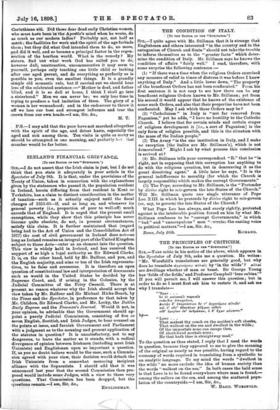THE CONDITION OF ITALY.
[To THE EDITOR OF THE "SPECTATOR."]
quite agree with Mr. Stillman that it is strange that Englishmen and others interested "in the country and in the antagonism of Church and State" should not take the trouble to inform themselves as to the "greater facts" which deter- mine the condition of Italy. Mr. Stillman says he knows the condition of affairs " fairly well." I read, therefore, with some surprise the following sentences :- (1) "If there was a time when the religions Orders exercised any measure of relief in times of distress it was before I knew anything of Italy." And a little lower down, "The property of the beneficent Orders has not been confiscated." From his first sentence it is not easy to see how there can be any beneficent religious Orders known to Mr. Stillman; yet from his second it would appear that be knows of the existence of some such Orders, and also that their properties have not been confiscated. May I ask which these Orders may be P (2) " Catholicism " in Italy is "not far removed from Paganism," yet he adds, "I have no hostility to the Catholic Church. I believe that for certain minds and certain stages of religious development it [i.e., a sort of Paganism] is the only form of religion possible, and this is the situation with the mass of the Italian people."
(3) The Army "is the one institution in Italy, and I make no exception [the italics are Mr. Stillman's], which is not demoralised." Might I ask by what process this conclusion is arrived at ?
(4) Mr. Stillman tells your correspondent "R." that he "is right, not in supposing that this corruption has anything to do with the religions question, but in denouncing it as the great dissolving agent." A little later he says, " It is the general indifference to morality (for which the Church is largely responsible) which makes the corrupt Governments."
(5) The Pope, according to Mr. Stillman, is the "Pretender by divine right to mis-govern the late States of the Church." Will Mr. Stillman quote one single utterance of Pope Leo XIII. in which he pretends by divine right to mis-govern (or, say, to govern) the late States of the Church P
What Pope Leo has always, and sorely rightly, protested against is the intolerable position forced on him by what Mr. Stillman confesses to be "corrupt Governments," in which " bad " and " unscrupulous " men " cxerciso the casting voice in political matters."—I am, Sir, &c.,
Borne, July 10th. Romiao.


































 Previous page
Previous page